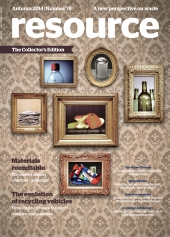Seizing the opportunity
With mounting calls for the UK to become more resource efficient, Jonny Hazell says we need to change the way we think about resources to fix the structural problems with our collection systems

As will be painfully familiar to anyone reading Resource magazine, UK resource policy has stalled. Our outdated, expensive, stagnating system wastes £1.7 billion in resource value every year, and stymies companies who want to invest in reuse, remanufacturing or reprocessing infrastructure, as well as those wanting to source recycled content from the UK. The second report from the Circular Economy Task Force, ‘Wasted Opportunities: smarter systems for resource recovery’, provides a vision of a better system, one designed to capture the maximum value from the products and materials that underpin our economy.
The problems with our current system are structural. At a local level, decisions about recovery systems have been based on arbitrary political boundaries and made by councils not focused on material value. At a national level, a lack of central government strategy and common standards reinforce our wasteful system, rather than helping to resolve the inefficiencies. Pressures on council funding mean poor outcomes are likely to be entrenched, undermining existing recycling and new opportunities to reuse and remanufacture.
Addressing this structural problem requires a shift in thinking: resource recovery should be based on preserving material value so that existing demand for high-value recyclate and recovered parts leads to investment in reprocessing infrastructure. In practice, this means that collection and processing systems need to operate at a suitable scale to meet the needs of high-quality reprocessors and remanufacturers.
The analysis in ‘Wasted Opportunities’ looks at three waste streams where there is clear potential to extract more value: biowaste; plastics; and electronics. It’s plastics where the failings of the current higgledy-piggledy approach are clearest. According to Recoup’s 2013 survey of household plastics collections, 96 per cent of local authorities collect plastic bottles, 60 per cent collect pots, tubs and trays, and just 16 per cent plastic films. And this covers just household packaging plastics, about one quarter of total UK plastic consumption. Analysis done by the Circular Economy Task Force suggests that our current approach to collection squanders up to £900 million in recyclate sales, and undermines the business case for up to £850 million in investment in new reprocessing infrastructure.
 This article was taken from Issue 78
This article was taken from Issue 78To extract anything like this value, we need to scale up and increase the consistency with which plastics are collected. This means multiple local authorities collaborating on a regional basis to collect the same types of plastic in the same ways, or, at the very least, in ways that yield the same quality outputs. The Welsh Government is encouraging this kind of approach through its ‘Collections Blueprint’ guidance and funding support for local authorities. The Scottish Government is working towards the same end through the requirements of its waste regulations. Both approaches should provide UK reprocessors with a secure supply of quality feedstock. To increase the quantity of material available, collection systems should also capture the same materials from both household and commercial sources, as is the case in Denmark.
Given the mood music coming out of Defra, it seems unlikely that the UK government will be following any of these leads unless forced to do so by the EU. But Westminster does have a choice of alternative ways to help. It could empower bottom-up collaboration between entrepreneurial councils by creating a £250-million challenge fund for circular infrastructure. The fund would enable councils to design their systems together, so that sufficient high-quality materials become available to justify private-sector investment in recycling and remanufacturing facilities. Alternatively, as part of its national infrastructure plans, the government could determine the infrastructure necessary to process materials like plastics and waste electronics at an economy-wide scale and set common collection standards for councils.
Or they could ignore industry’s repeated calls for action, do nothing and perpetuate a system that creates higher costs for council tax payers and leaves businesses frustrated by the lack of secure supplies of recycled materials.







